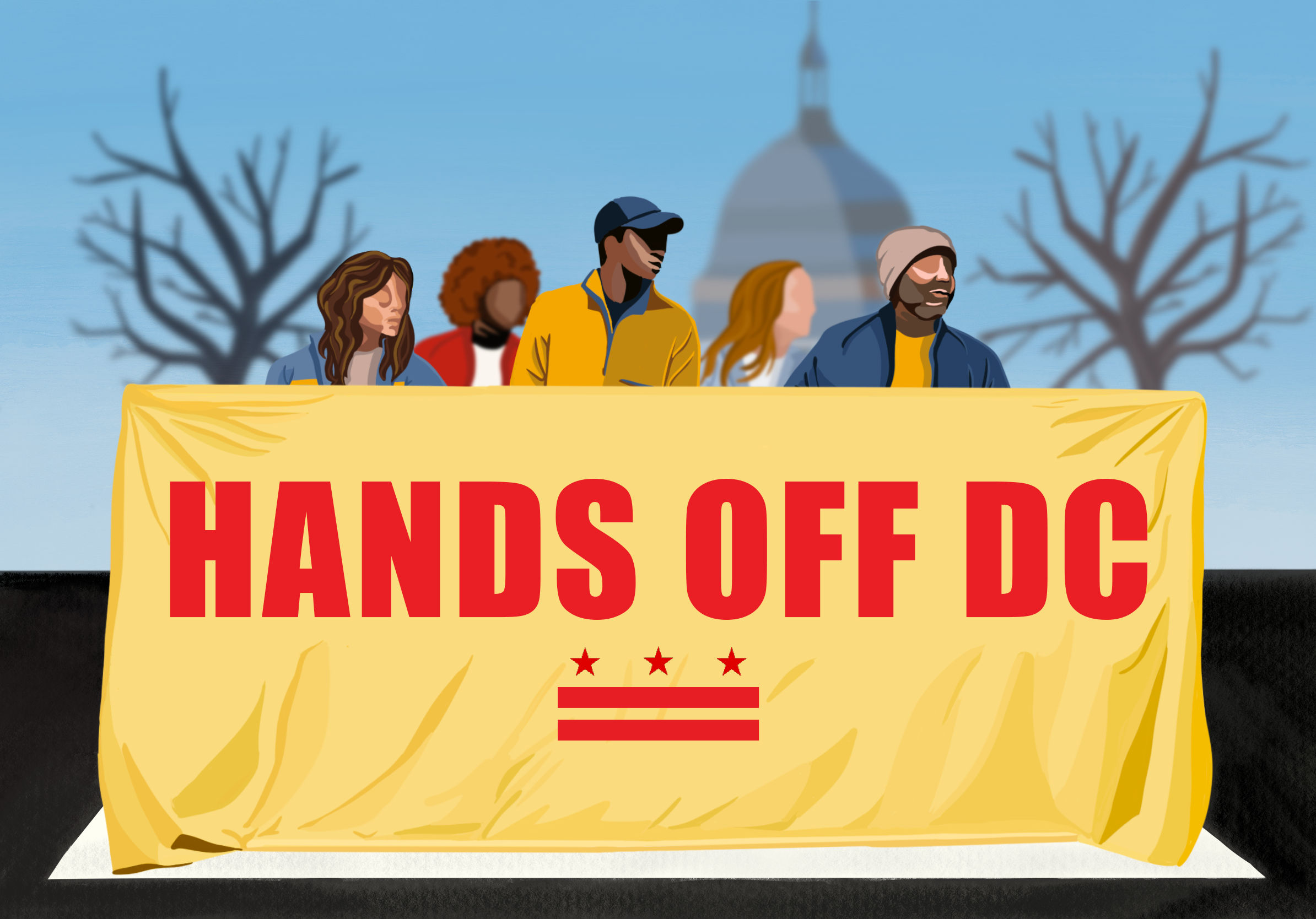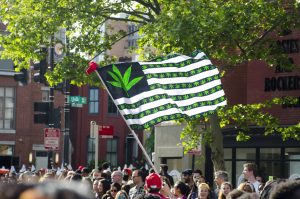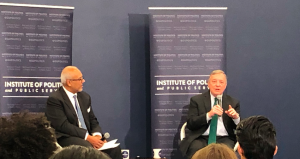A sharp increase in congressional interference in D.C. affairs over the last few weeks has sparked a high-stakes fight for D.C. statehood and local autonomy after a vote in Congress to overturn the District’s revised criminal code. On March 8, statehood activists and elected officials gathered to speak out against their lack of independence at the “Hands Off DC” rally outside Union Station. U.S. Capitol Police arrested at least 17 protesters during the subsequent march on Capitol Hill, including U.S. Shadow Representative of the District Dr. Oye Owolewa.
The rally was organized by a coalition of D.C. statehood advocacy groups, including DC Vote, DC Justice Lab, and Don’t Mute DC, in reaction to a congressional disapproval resolution. Congress sought to overturn the long-awaited overhaul of D.C.’s criminal code that would expand rights to a jury trial for misdemeanor crimes and reduce maximum penalties for certain violent crimes, among other significant changes.
Under the 1973 District of Columbia Home Rule Act, D.C. Council legislation requires congressional approval before becoming law. The Senate passed the congressional resolution on March 8, marking the first time Congress has successfully voted to overturn D.C. law in over 30 years. President Joe Biden then signed into law a measure blocking the D.C. Council’s criminal code on March 20.
Owolewa said in an interview with the Voice that he risked arrest via civil disobedience during the rally to highlight the importance of D.C. autonomy and give D.C. residents their voice back.
“I joined the protest, and I was the only elected official in D.C. to get arrested, to really put it on the line and risk our freedom so D.C. residents can enjoy theirs,” he said.
Historically, Congress has chosen to respect D.C.’s right to self-governance and has only introduced seven disapproval resolutions in the last 50 years. The current Congress, however, has attempted to overturn D.C. legislation twice in the last several weeks: first on Feb. 9 opposing a bill that would extend local voting rights to noncitizens, and again on March 8 targeting the revised criminal code.
Owolewa stressed that while both bills were somewhat controversial for many members of Congress, the issue at hand isn’t one for partisan politics.
“There has been a lot of debate, and I appreciate that, but it belongs to D.C. residents. It doesn’t belong to Congress. It doesn’t belong to the president to put his thumb down,” he said.
The crime bill passed the D.C. City Council unanimously twice; first to send the bill to Mayor Muriel Bowser, who vetoed, and second to override the veto.
Kelsye Adams, director of programming at DC Vote, expressed her frustration with the District’s lack of statehood. “The biggest issue is that we should be able to represent ourselves, and we have elected officials that we chose and trust to make decisions on our behalf, and they are not allowed due to congressional [interference],” she said. DC Vote is a citizen engagement and advocacy group that organizes pro-statehood initiatives such as the “Hands Off DC” rally.
Owolewa sent a letter to the White House on Feb. 20 urging Biden to use his veto power to halt the congressional veto and return lawmakers’ focus back to national issues. In response, Biden sent a letter reassuring Owolewa of his support of D.C. autonomy.
“Taxation without representation and denial of self-governance are an affront to our Nation’s founding values. That is why my Administration strongly supports making Washington, D.C. a state and providing its residents with long-overdue full representation in Congress. Doing so will make our Nation stronger, fairer, and more just,” Biden wrote to Owolewa in an official correspondence with the White House that he shared with the Voice.
Within 24 hours of the arrival of Biden’s letter to Owolewa, however, Biden tweeted that he would not use his veto power and would sign Congress’ bill to overturn D.C. Council legislation. According to Owolewa, Biden erred in greenlighting federal intervention into D.C. affairs, contradicting his claim to support D.C. statehood.
“[Biden] put things on a scale. He put Fox News and headlines on one side of the scale and put D.C. voting rights on the other,” Owolewa said. “He seemed to favor and pay more attention and prioritize winning headlines, not looking soft on crime, than he really did looking into the facts of this bill and looking into the autonomy of D.C. residents.”
“We just weren’t priority enough to him,” he added.
To Adams, Biden’s signature would have serious implications for the democratic process. The precedent would not, however, slow Adams from advocating for D.C.’s self-governance.
“We’ll keep hitting the floor each and every day until we have [statehood],” Adams said. “So the only impact that I would say this movement is going to have is that it may have to fight harder.”
Adams urged all residents of the District to follow the work of “Hands Off DC,” regardless of their political affiliation. “It’s truly nonpartisan because it doesn’t matter who you are. If you decide to live in D.C., you won’t be making decisions for yourself.”
Owolewa plans to continue speaking out on issues like D.C. statehood. He hopes to see more supporters lobbying for change and pushing other states to champion the cause and speak to their Congress members.
“I also want to remind folks out there that regardless of what bills we passed or whether they agree with it or not, this isn’t about the bill. This is about D.C. residents having final say over their laws and having final say over our budget and our resources,” he said. “We’re not trying to be treated better. We want to be treated the same.”






